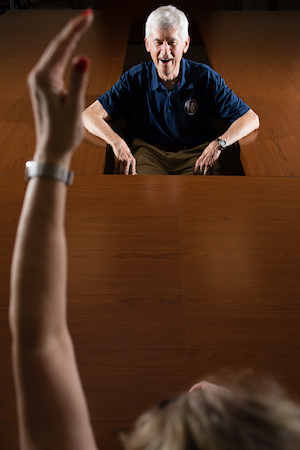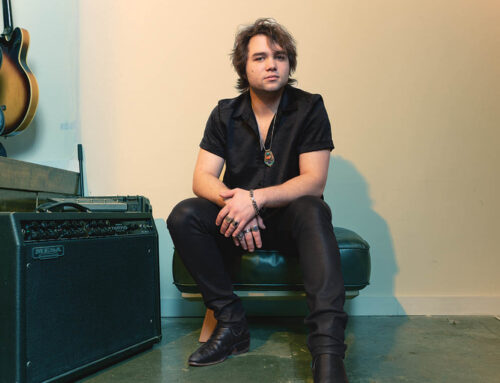
Photo by: Rasy Ran
Lou Neeb overlooked that his right hand sporadically trembled and that his sense of smell dulled.
He didn’t notice his voice fading.
The retired Preston Hollow businessman is naturally soft-spoken, but he suddenly sounded hoarse. His co-workers constantly asked him to repeat himself. His grandkids insisted that he mumbled over the phone.
“I was of the opinion everyone else was having hearing problems,” Neeb says.
The symptoms of Parkinson’s disease — tremors, voice loss, rigid muscles, impaired posture and balance, and slowed movement — first took hold of Neeb’s body in the early 2000s. An avid runner and cyclist, he noticed his flexibility deteriorating and his muscles stiffen. His body felt different, but he blamed the changes on aging.
An annual check-up at the Cooper Clinic in 2008 proved Neeb wrong. Dr. Kenneth Cooper noticed the shaking in Neeb’s right hand and sent him to a neurologist.
An MRI confirmed what the doctors suspected. At age 69, Neeb was diagnosed with Parkinson’s disease.
The progressive neurological condition is caused by the loss of dopamine, a neurotransmitter that controls automatic movements like walking, talking and swallowing. There’s no cure for the disorder, although medication can alleviate some of the symptoms.
Usually determined and self-assured, Neeb prides himself on how well he’s adapted to adversity over the years. After the Great Depression wrecked his parents’ finances, it took years for the family to recover. Neeb got his first job washing pots and pans as a 10 year old in his northern Indiana hometown.
Tragedy struck in 1967. He and his wife, Sharon, were in a bad car accident that killed her and left him unconscious for four hours. Neeb was thrust into the role of a single parent. He refused to leave Washington D.C., where they then lived, to maintain some semblance of familiarity for his children. He slowly rebuilt his life and married a woman named Jean before relocating to Dallas.
Yet he couldn’t fathom losing control of the same body that carried him through 65 marathons and five ultramarathons. Leaving the neurologist’s office, Neeb decided it must be a misdiagnosis.
“I didn’t know much about it,” Neeb says. “The words Parkinson’s did scare me on a psychological level. I thought, ‘That can’t be right.’ ”
For five years, Neeb pretended that he didn’t have the condition that slowly weakened his voice and muscle control. His sentences faded into a whisper, and a hunch formed when he walked.
When a friend’s wife also was diagnosed with Parkinson’s disease, he and Jean convinced Neeb to visit the Parkinson Voice Project in 2013. Neeb reluctantly agreed to tour the Richardson-based nonprofit that offers speech therapy and support to those with the disorder.
He was hooked.
Nearly 13 years after Neeb began losing his voice, he started speech therapy and taking medication. He joined a high-intensity cycling class to improve his balance and to help produce dopamine.
Neeb befriended people facing Parkinson’s. The Parkies, as they call themselves, meet regularly as an impromptu support group.
“Once I got here, I realized there’s a lot of other people in the area with it,” he says. “It’s the positive reinforcement. It’s the fact we all have it in common.”
Denial is common when people learn they have the disorder, says Samantha Elandary, who founded the nonprofit in 2005. People become discouraged hearing that Parkinson’s disease is degenerative and without a cure.
“Instead of focusing on that there’s no cure, focus on what we can do,” Neeb says. “We’re a ‘can do’ country. Why not this time?”
The cause of Parkinson’s disease has baffled researchers as much as finding its cure. According to the Parkinson’s Disease Foundation, exposure to environmental toxins or injuries could cause dopamine loss.
Neeb believes the car accident that killed his wife also damaged his brain. His head slammed into the driver’s side door so forcefully that it bent the doorframe during the collision.
“It’s just the deck I was dealt,” he says.
Neeb graduated from the one-on-one therapy program, but he still attends a group session to keep his vocal cords strong and is an advocate for the Parkinson Voice Project.
Neeb realized how effective the speech therapy had been while on the phone with his grandchildren. Mid-conversation, his grandson told him this was the first time in years they could hear what he was saying.
It was the most relief Neeb had felt since he’d been diagnosed.






